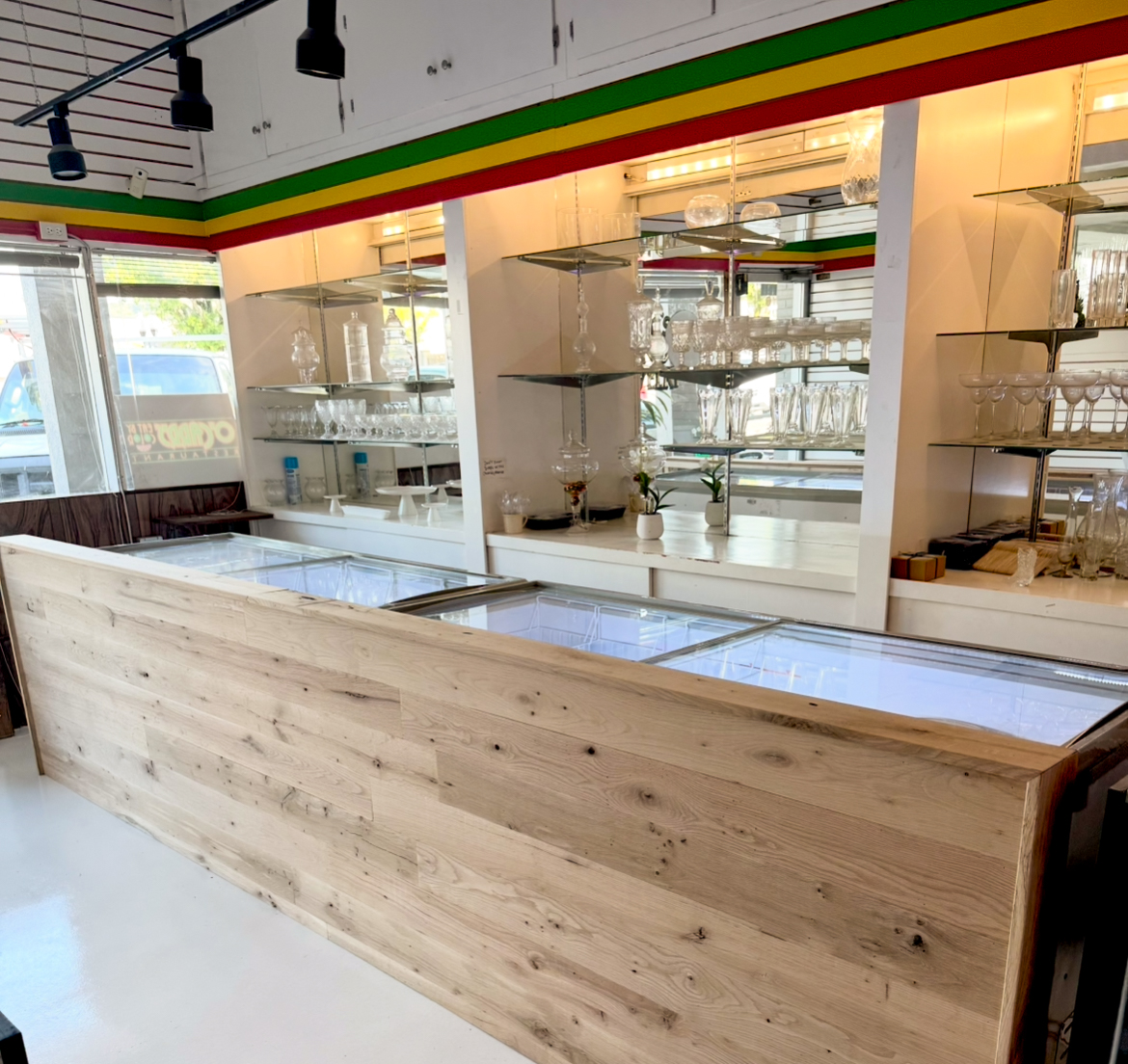Meet Neowaste and Moovmo, 2 Birmingham-based Alabama Launchpad winners set to transform their industries
Reading time: 11 minutes
Sponsored

“Since the beginning of human history, man has buried his waste in a hole in the ground.” That was Jessica Findley’s opening line in her $100,000 prize-winning pitch at the Alabama Launchpad Startup Competition in Huntsville last September. “We still do that today,” said Findley, co-founder and CEO of Neowaste. “One of the only places we haven’t innovated is waste management, which is so damaging to our environment.” But she is helping to change that.
Neowaste and Moovmo, the winners of the September competition, are two tech startups that could not be more different in concept, but they have two things in common:
- The prize money is valuable, but the expert coaching and mentorship from Alabama Launchpad, a program of the Economic Development Partnership of Alabama (EDPA), is priceless.
- These companies possess not only the potential to create jobs in Alabama and beyond, but also to transform our world in vital ways.
Bham Now caught up with the founders of both companies to gain an insider’s view of how the Alabama Launchpad competition works and to ask them what’s next.
Neowaste: $100,000 seed-stage winner
The Big Idea: turn automotive plastic and tire waste into fuel right here in Birmingham using Polycrack Technology.
Birmingham Roots
“No one grows up thinking they’re going to be in the waste management industry. Now I can’t imagine doing anything else.”
Jessica Findley, Neowaste co-founder and CEO
Findley grew up in East Lake and attended Clay-Chalkville High School. She enrolled in Birmingham-Southern College and completed her bachelor’s degree at Miles College. She thought she might one day analyze data for the Census Bureau. But her first job out of college, grant writing for the city of Bessemer, changed the course of her career forever when she was assigned to work on a grant for a tire recycling company. The owner of that company recruited her.
“That’s when I learned everything there was to know about scrap tire and scrap tire recycling and converting tire shred into fuel,” Findley said. That’s also where she worked with Polycrack Technology for the first time. Developed in India by inventor and patent holder TR Rao, the innovative technology can convert practically any waste into fuel without incineration.
That experience led to an executive position with a multinational waste-to-fuel company headquartered in Birmingham, with a presence in 47 countries. She traveled the world leading the integration of Polycrack Technology into that corporation’s portfolio, rose to the position of executive vice president and earned her MBA from the Hult International Business School in London in the process. But eventually, her attention turned back to home.

The Inspiration
It was 2017, and the global plastic recycling market was crashing. At the same time, many automotive companies were adopting zero landfill targets in response to growing public awareness of waste and ocean plastic, Findley said.
“I kept getting calls asking if we were doing anything here in Alabama. They were saying, ‘We have waste that we can’t recycle, and we can’t send it to the landfill. We don’t want to send it to the incineration facility.’”
Jessica Findley, Neowaste co-founder and CEO
One of those calls lit a fire under Findley. It came from Fernando Valentin, a professional in the automotive packaging and recycling industry, who asked her about bringing Polycrack Technology home to Birmingham. Soon after, she asked to get out of her company’s non-compete clause so she could start her own company.

By March 2018, she and Valentin co-founded Neowaste to address the growing waste disposal needs of Alabama’s automotive manufacturers and suppliers. The Southern Research Prosperity Fund accepted Neowaste into its mentorship program, and the pair also applied to their first Alabama Launchpad Startup Competition.
The Pieces Fall Into Place
In its first go-round, Neowaste advanced to the Alabama Launchpad semifinals, but not the finals. However, the experience alone helped exponentially.
“Even though we started the company for automotive manufacturers and suppliers, that’s just the entry point to the global waste market. The Polycrack system is not limited to processing plastics. It can also process tires, municipal solid waste, vegetable oil, petroleum by-products, sewage waste, bamboo, wood chips, electronic waste and other materials and combinations thereof. The amount of fuel we generate depends on the type of feedstock we use. Plastic gives us the highest yields.
“We were trying to be all things to all people. Alabama Launchpad helped us hone in on a very specific market and problem so that we could build a single project opportunity. Our mentors through the Southern Research Prosperity Fund really helped with that, too.”
Jessica Findley, Neowaste co-founder and CEO
By the time Alabama Launchpad applications were due for the third-quarter competition, three key aspects of Neowaste’s business plan had fallen into place:
- A feedstock supplier came on board who could provide 25 tons of plastic waste a day.
- Neowaste secured an exclusive license with Polycrack Worldwide Limited. Additionally, Rao, the inventor and patent holder, joined Neowaste as co-founder and chief technology officer.
- A major oil company, Sunoco, provided a letter of interest to purchase Neowaste’s fuel.

For The Win
Neowaste’s second go-round in the Alabama Launchpad Startup Competition began with the initial application, which only gives entrepreneurs 2,000 words to explain their business plan.
“That’s a challenge. It made us really focus on what are the important pieces of this business that we need to convey to show the judges this is a commercially viable opportunity,” Findley said.
Again, Neowaste made it to the semifinal round. The judges provided feedback, and semifinalists had 1,000 words to respond. This time, Neowaste progressed to the final round.
They prepared their pitch deck and had a practice pitch where judges gave them advice on layout, graphics and storytelling to fine-tune their presentation.
“The Alabama Launchpad judges’ feedback as we went through the process was priceless.”
Jessica Findley, Neowaste co-founder and CEO
Next Steps
What will the $100,000 prize money allow Neowaste to do? Answer: take a critical next step in their business plan—purchasing and shipping a pilot plant from India. Neowaste plans to locate in west Birmingham near pipeline terminals. With a batch capacity of 200 to 220 pounds of plastic, the pilot plant can produce 30 gallons of fuel per day.

“Our potential investors and lenders want to put their eyes on something. We could send them to India and show them some of the bigger Polycrack facilities. But people want to see us do something here. They want to see us put waste in the system and get a product out on the other side.”
Jessica Findley, Neowaste co-founder and CEO
Successfully running the pilot plant in Birmingham will enable Neowaste to qualify its feedstock and its fuel product, and hopefully turn the major oil company’s letter of interest into an agreement of purchase for a number of years, after local tests confirm the plant can produce fuel to its specs.
“The testing we’ve already done (in India) shows we are well within their acceptance standards,” Findley said. “Some of the tests show that our fuel is a better quality than what is coming out of the pipeline and is cheaper.”
Second, the prize money will enable Neowaste to procure system performance insurance. “It’s a guarantee so that lenders will feel better about lending to a project that is still considered by many around the world to be a new technology,” Findley said.
“We have a handful of competitors in the U.S. and several others outside, but there hasn’t been much commercial operation yet. We’re hoping to be commercial leaders of Polycrack Technology in the Southeast and to get this insurance product which, to our knowledge, no one else in our industry has, to reduce risk for our potential lenders and investors.”
To Sum It Up
“Alabama Launchpad gave us a big head start. We would have had to raise the money for the pilot plant. Without the Launchpad funding, that would have been a whole other round of fundraising that we had to go through. It sped up our timeline. When we look back 10 or 20 years from now, we’ll look back and see Alabama Launchpad as where we started. And hopefully we’ll be looking back from a really good position in the marketplace.”
Jessica Findley, Neowaste co-founder and CEO
Once Neowaste proves the concept on Alabama soil via the pilot plant—and secures system performance insurance, a purchase agreement for the fuel and enough lenders and investors—the next step is a full-scale plant. That plant would run continuously, transforming 25 tons of plastic into 6,000 gallons of fuel per day.
Moovmo: $50,000 concept-stage winner
The Big Idea: increase independence of people with disabilities via wheelchair-accessible ride sharing.

Birmingham Roots
Moovmo founder Daryl Harris grew up in Birmingham metro’s East Thomas community off Arkadelphia Road. He graduated from A.H. Parker High School, earned his bachelor’s degree from UAB and his law degree from the University of Alabama. He later moved around the country, but ultimately came back home to his roots.
The Inspiration
“For the past several years, I’ve been working for a supportive housing organization that provides long-term residential placement and in-home support for individuals with disabilities. One of the biggest challenges for individuals who want to be more independent is the lack of on-demand, accessible transportation. That limits their access to recreational, social and civic activities.”
Daryl Harris, Moovmo founder
Harris wants to remove that limitation through Moovmo, an app-based ride-sharing service for people who require wheelchair-accessible vehicles. The business model includes upfront and affordable fares, 24/7 service, vetted and trained drivers, and regularly inspected vehicles, as well as on-demand, dedicated and scheduled rides.

Fact: 3.5 million Americans are permanent wheelchair users, and only about 3 percent of them own their own accessible transportation. Yet, in today’s market, private, on-demand accessible car services are virtually nonexistent.
Though Harris is new to tech, he’s partnering with Airship, a Birmingham-based company that designs and develops custom software for companies and entrepreneurs, to build the app.
For The Win
Like Neowaste, the Moovmo business model improved as it advanced through the Alabama Launchpad competition, thanks to expert feedback along the way.
“The first evaluation caused me to think about a lot of things as it relates to the service that I hadn’t thought about prior. I adjusted my business model from there.”
Daryl Harris, Moovmo founder

The process of evaluation and adjusting happened twice before the final round.
“Ultimately, by the time I actually pitched in the competition in Huntsville, my presentation had changed significantly because of my participation in the competition and the feedback that I got from the local business and tech community.”
Daryl Harris, Moovmo founder
Next Steps
In the concept stage, entrepreneurs are at the beginning of their business. When I talked to Harris, he was stuffing envelopes to send to other investors. He has a team of mentors and advisors that are guiding him, and the $50,000 enables him to continue to move forward to raise the funds he needs to launch.
To Sum It Up
“Before Alabama Launchpad, I didn’t realize the tech and startup infrastructure we have in place here in Alabama, and I didn’t realize the community of people who are willing to help and support.”
Daryl Harris, Moovmo founder
Learn more about Alabama Launchpad at alabamalaunchpad.com and follow on Facebook, Instagram and Twitter.
Sponsored by:




